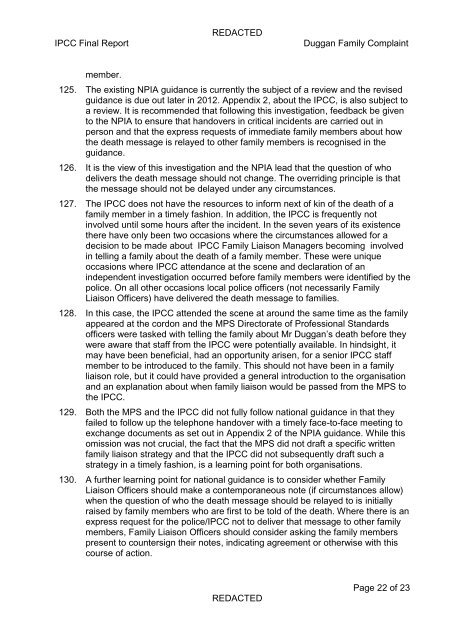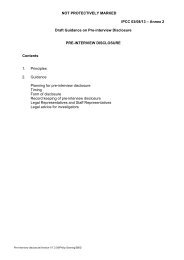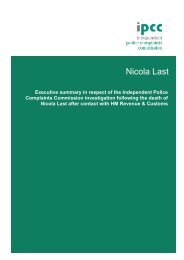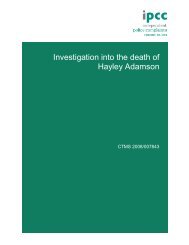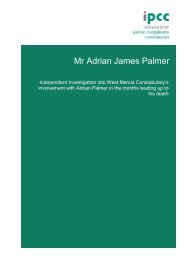Duggan_Final_Report_Foreword_29_Feb_2012 - Independent ...
Duggan_Final_Report_Foreword_29_Feb_2012 - Independent ...
Duggan_Final_Report_Foreword_29_Feb_2012 - Independent ...
You also want an ePaper? Increase the reach of your titles
YUMPU automatically turns print PDFs into web optimized ePapers that Google loves.
REDACTED<br />
IPCC <strong>Final</strong> <strong>Report</strong> <strong>Duggan</strong> Family Complaint<br />
member.<br />
125. The existing NPIA guidance is currently the subject of a review and the revised<br />
guidance is due out later in <strong>2012</strong>. Appendix 2, about the IPCC, is also subject to<br />
a review. It is recommended that following this investigation, feedback be given<br />
to the NPIA to ensure that handovers in critical incidents are carried out in<br />
person and that the express requests of immediate family members about how<br />
the death message is relayed to other family members is recognised in the<br />
guidance.<br />
126. It is the view of this investigation and the NPIA lead that the question of who<br />
delivers the death message should not change. The overriding principle is that<br />
the message should not be delayed under any circumstances.<br />
127. The IPCC does not have the resources to inform next of kin of the death of a<br />
family member in a timely fashion. In addition, the IPCC is frequently not<br />
involved until some hours after the incident. In the seven years of its existence<br />
there have only been two occasions where the circumstances allowed for a<br />
decision to be made about IPCC Family Liaison Managers becoming involved<br />
in telling a family about the death of a family member. These were unique<br />
occasions where IPCC attendance at the scene and declaration of an<br />
independent investigation occurred before family members were identified by the<br />
police. On all other occasions local police officers (not necessarily Family<br />
Liaison Officers) have delivered the death message to families.<br />
128. In this case, the IPCC attended the scene at around the same time as the family<br />
appeared at the cordon and the MPS Directorate of Professional Standards<br />
officers were tasked with telling the family about Mr <strong>Duggan</strong>’s death before they<br />
were aware that staff from the IPCC were potentially available. In hindsight, it<br />
may have been beneficial, had an opportunity arisen, for a senior IPCC staff<br />
member to be introduced to the family. This should not have been in a family<br />
liaison role, but it could have provided a general introduction to the organisation<br />
and an explanation about when family liaison would be passed from the MPS to<br />
the IPCC.<br />
1<strong>29</strong>. Both the MPS and the IPCC did not fully follow national guidance in that they<br />
failed to follow up the telephone handover with a timely face-to-face meeting to<br />
exchange documents as set out in Appendix 2 of the NPIA guidance. While this<br />
omission was not crucial, the fact that the MPS did not draft a specific written<br />
family liaison strategy and that the IPCC did not subsequently draft such a<br />
strategy in a timely fashion, is a learning point for both organisations.<br />
130. A further learning point for national guidance is to consider whether Family<br />
Liaison Officers should make a contemporaneous note (if circumstances allow)<br />
when the question of who the death message should be relayed to is initially<br />
raised by family members who are first to be told of the death. Where there is an<br />
express request for the police/IPCC not to deliver that message to other family<br />
members, Family Liaison Officers should consider asking the family members<br />
present to countersign their notes, indicating agreement or otherwise with this<br />
course of action.<br />
REDACTED<br />
Page 22 of 23


